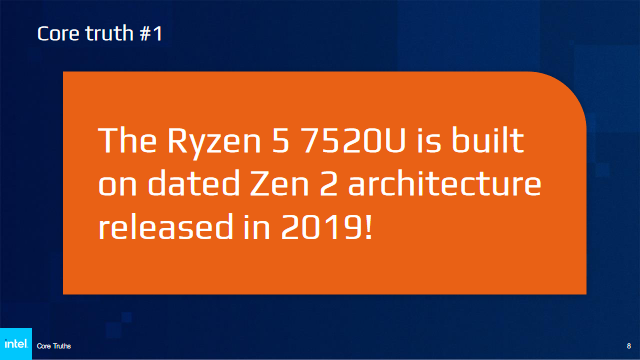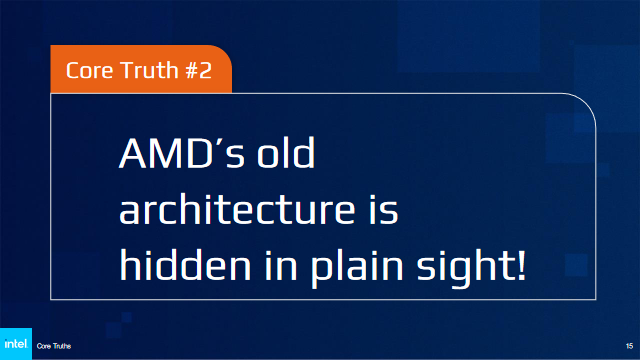Intel posted a slideset called "Core Truths" which calls out AMD for rebranding old CPU architectures as new.


I think this is correct and AMD deserves to be criticized for such preying on unsuspecting buyers. However this is an instance of the Intel pot calling the AMD kettle black, as Intel has also extensively rebranded their CPU architectures in the past. Unforgotten is Skylake and its refreshes which were with us from Core 7th (2015) to 10th (2020) gen. Nowadays we have the 14th gen, which is not new at all compared to 13th gen, which in turn was a mix of new Raptor Lake and rebranded 12th gen Alder Lake CPUs.
A Twitter comment noted that this is may be preparation for the next Intel rebranding to Core 1 series, which will presumably include Meteor Lake, Raptor Lake and perhaps also Alder Lake CPUs.
https://videocardz.com/newz/intel-compares-amd-zen2-architecture-in-ryzen-7000-series-to-snake-oil
https://twitter.com/momomo_us/status/1731666819818356987


I think this is correct and AMD deserves to be criticized for such preying on unsuspecting buyers. However this is an instance of the Intel pot calling the AMD kettle black, as Intel has also extensively rebranded their CPU architectures in the past. Unforgotten is Skylake and its refreshes which were with us from Core 7th (2015) to 10th (2020) gen. Nowadays we have the 14th gen, which is not new at all compared to 13th gen, which in turn was a mix of new Raptor Lake and rebranded 12th gen Alder Lake CPUs.
A Twitter comment noted that this is may be preparation for the next Intel rebranding to Core 1 series, which will presumably include Meteor Lake, Raptor Lake and perhaps also Alder Lake CPUs.
https://videocardz.com/newz/intel-compares-amd-zen2-architecture-in-ryzen-7000-series-to-snake-oil
https://twitter.com/momomo_us/status/1731666819818356987
![[H]ard|Forum](/styles/hardforum/xenforo/logo_dark.png)

